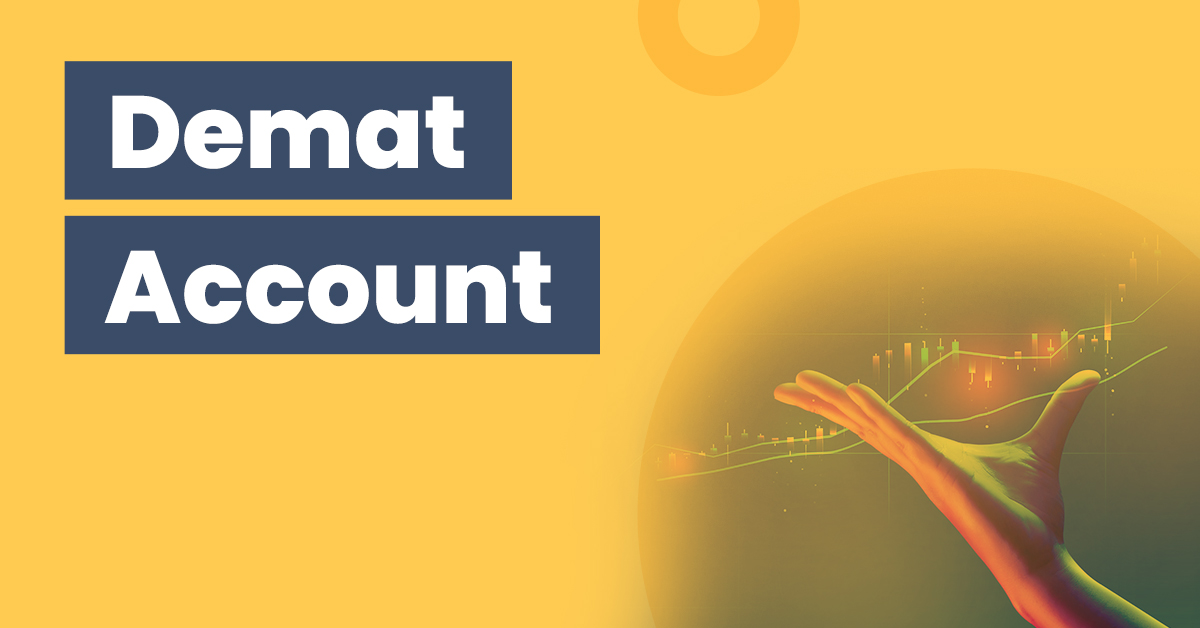What Is a Demat account?


Since the Securities and Exchange Board of India (SEBI) introduced the concept of dematerialisation, investors no longer need to carry physical certificates for their securities. Now, they can store digital certificates of securities in their Demat accounts.
The introduction of Demat accounts revolutionised investing and trading in the Indian stock market. It digitised the entire market and got rid of the problems of theft, damage, and storage associated with the earlier method of storing securities.
The sections below will help you understand the Demat account in detail so you can get started on your investment journey.
What is a Demat account?
The Demat account system was introduced in 1996 by SEBI to eliminate discrepancies and promote efficient document management. A Demat or dematerialised account stores your securities and financial certificates electronically via a Depository Participant, who is responsible for opening a Demat account for you. By storing your holdings electronically, you can reduce the chances of document misplacement, theft, or damage.
Demat accounts are regulated and maintained by the two depositories, namely, Central Depository Services Limited (CDSL) and National Securities Depositories Limited (NSDL). A Depository Participant (DP) or broker acts as an intermediary between you and the depositories. Simply put, you can store your securities in any depository via a DP.
Before we discuss Demat accounts in detail, you must remember that a Demat account only acts as a storage facility for your securities and does not facilitate transactions. To buy or sell securities, you will need a trading account.
Why do you need a Demat account?
- Stores a variety of securities
It is a common misconception that Demat accounts only hold stocks. You can also store multiple financial instruments like mutual funds, government securities, Exchange Traded Funds (ETFs), bonds, etc.
- Eliminates physical certificates
Physical certificates are hard to manage and maintain as they are vulnerable to theft, damage, forgery, and misplacement. Moreover, Demat accounts are maintained and regulated by depositories like NSDL (National Securities Depositories Limited) and CDSL (Central Depository Services Limited). So you can store and manage your digital securities safely and with ease.
- Accessible anytime and anywhere
Being a virtual depository, a Demat account can be accessed remotely at any time through the DP’s portal or application.
- Facilitates faster transaction
Gone are the days when people had to stand in never-ending queues and proceed through tiresome documentation processes for every transaction. Having a Demat account helps you trade your securities without having to go through complex processes, thereby saving time and effort.
- Change your address without any worries
An investor can have multiple Demat accounts registered with varied brokers. In the case you change your current address, you only have to update your address on your Demat account portal, rather than having to update them separately for all brokers.
- Nomination
All brokers provide a nomination facility wherein up to three people can be nominated. In case of the demise of the account holder, the securities will be transferred as per the nomination declaration upon submission of the required documents.
- Loan collateral
All the securities held in the Demat can be given as collateral for securing a loan from the financial institution or broker.
Types of Demat account
There are 4 types of Demat accounts offered by Depository Participants (DPs) which are as follows:
- Regular Demat Account
Any citizen of India with valid citizenship proof can apply for a regular Demat account. A Demat account holder can easily switch between financial firms without having to pay any additional charges. Furthermore, regular or active traders can heavily benefit from this Demat account, which charges comparatively lower service charges than a Basic Service Demat Account (BSDA).
Lastly, a regular Demat account allows a joint account holding feature, which allows multiple holders to own a single Demat account.
- Basic Service Demat Account (BSDA)
A BSDA is similar to a regular Demat account. However, the account is more suitable for beginner and passive investors/traders. It allows them to hold shares worth up to ₹ 50,000 without having to pay any annual maintenance charge (AMC). For holdings worth ₹ 50,000 to ₹ 2 lakh, only nominal maintenance charges of ₹ 100 are applicable, whereas for shareholdings above ₹ 2 lakh traders have to pay regular Demat account charges.
A Basic Service Demat Account does not support the joint account feature. Hence, only a single person can own a BSDA.
- Repatriable Demat Account
Repatriable Demat accounts are used by NRIs (Non-resident Indians) who want to invest in the Indian stock market and transfer their funds through an NRE (Non-resident External) account. The account holders must have an RBI-authorised trading account in their name with any financial institution to transfer their foreign earnings in Indian currency.
Before opening a repatriable Demat account you will have to close your existing Indian Demat account. Furthermore, unlike the BSDA, a repatriable Demat account lets account holders hold them jointly.
- Non-Repatriable Demat Account
Unlike repatriable Demat accounts, a non-repatriable Demat account does not allow its NRI holders to transfer their funds abroad. Instead, NRI account holders can store their generated income from India in Indian denominations. A non-repatriable Demat account has to be connected with a Non-Resident Ordinary (NRO) account, which is taxable, unlike an NRE account.
It should also be noted that investments made by NRIs in India are regulated by the Foreign Exchange Management Act (FEMA).
How Does a Demat Account Work?
As stated earlier, a Demat account acts as a repository to store your securities in the form of electronic data. Every Demat account has a unique Demat number assigned by the respective depositories. These account numbers represent the address of your Demat account and the securities stored in it.
To purchase or sell securities electronically, you need a linked trading account first. First, you need to sign in to the trading account and place an order to buy or sell securities, which is passed on by the depository participant to the stock exchange.
The stock exchange matches a “buy” request with a corresponding “sell” request, and vice versa. Subsequently, your Demat account is debited or credited with the shares, and the corresponding funds are sent or received to your bank account by the end of the trading session.
Let us understand the same with an example:
Suppose your Demat account has 100 shares of Company XYZ trading at ₹10. If you sell 50 shares at this price, your Demat account will be debited for 50 shares and your connected bank account will be credited with ₹10 x 50 = ₹500, and vice-versa in case you are willing to purchase equities.
Document Required to Open a Demat Account
To open a Demat account you will need the following documents:
- Identity Proof
- PAN (mandatory)
- Aadhar card
- Voter ID card
- Driving licence
- Any Government authorised ID
- Address Proof
- Aadhar card
- Voter ID
- Driving licence
- Passport
- Income Proof
- Income Tax Return (ITR) copy
- Salary payslip
- Bank Account Details
- Passbook
- Account statement
- Cancelled cheque book
How to Open a Demat Account?
Follow the below-mentioned steps to open a Demat account:
Step 1: Select and approach a reputed Depository Participant or broker to open a Demat account. Remember to check which depository (NSDL or CDSL) it is associated with.
Step 2: Fill out the registration form which requires you to input all your basic details and documents including the mandatory PAN.
Step 3: Sign the agreement stating your role and duties as an investor. Remember to keep a copy of the document for future reference.
Step 4: Complete the KYC verification.
Step 5: After the completion of the above-mentioned steps the DP will assign you a Demat account with a unique Demat number.
Charges Levied on Demat Charges
The main charges levied on a Demat account are as follows
- Account maintenance charges (AMC)
- Transaction charges
- Dematerialisation or Rematerialisation charges
Other nominal fees include account opening charges and other service charges based on the Depository Participant’s terms and conditions. Furthermore, you can check the charges levied by NSDL and CDSL respectively by going through their respective portal.
Final Word
Before you open your first Demat account, make sure to check the Demat account charges as well as the quality of the brokerage and its services provided. Furthermore, if you are an active trader, you may want to avail monthly flat-rate AMC so that you don’t have to pay for every single transaction.
On the other hand, if you are a passive trader, you may opt for BSDA, which attracts lower AMC charges than a regular Demat account.
Frequently Asked Questions
How to differentiate a Demat account under NSDL and CDSL?
You can easily determine a DP’s depository by checking your Demat account number. If this Demat account has 16 digits, then your DP is registered under CDSL. In contrast, Demat accounts registered under NSDL have a 14 digit account number.
Can I open multiple Demat accounts with different brokers?
Yes, you can open multiple Demat accounts with varied brokers as long as you have a valid PAN and completed the KYC verification.
Can a minor open a Demat account?
Although minors can open a Demat account, they will need a legal guardian who will supervise trading through their PAN and trading account.
Is there any limit to the number of shares I can hold in my Demat account?
If you are holding a Basic Service Demat Account, shareholdings within ₹50,000 are exempted from AMC charges. Shareholding within ₹50,000 to ₹2 lakh, is subject to nominal charges, whereas shareholding beyond ₹2 lakhs is charged as per regular Demat account. In other types of Demat, there is no limit on the number of shares that can be held.




